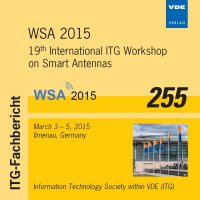How to Make Quasi-Rectilinear Signals (MSK, GMSK, OQAM) Almost Equivalent to Rectilinear Ones (BPSK, ASK) for Widely Linear Filtering in the Presence of CCI
Conference: WSA 2015 - 19th International ITG Workshop on Smart Antennas
03/03/2015 - 03/05/2015 at Ilmenau, Deutschland
Proceedings: WSA 2015
Pages: 6Language: englishTyp: PDF
Personal VDE Members are entitled to a 10% discount on this title
Authors:
Chauvat, Remi; Chevalier, Pascal (CNAM, CEDRIC Laboratory, 292 rue Saint-Martin, 75003 Paris, France)
Chauvat, Remi; Chevalier, Pascal (Thales-Communications-Security, HTE/AMS/TCP, 4 Av. des Louvresses, 92622 Gennevilliers, France)
Delmas, Jean-Pierre (Telecom SudParis, UMR CNRS 5157, 9 rue Charles Fourier, 91011 Evry, France)
Abstract:
Widely linear (WL) receivers are able to fulfill single antenna interference cancellation (SAIC) of one rectilinear (R) or quasi-rectilinear (QR) co-channel interference (CCI), a function which is operational in GSM handsets in particular. However, SAIC requires enhancements for QR signals, for both VAMOS standard, an evolution of GSM/EDGE standard, and FBMC-OQAM networks, which are candidate for 5G mobile networks. In this context, the purpose of this paper is twofold. The first one is to show that, contrary to what is accepted as true in the literature, QR signals may be less efficient than R ones for some standard WL filtering in the presence of CCI. From this result and for QR signals, the second purpose is to propose a SAIC/MAIC enhancement, based on WL frequency shifted (FRESH) filtering, making QR signals always almost equivalent to R ones.


